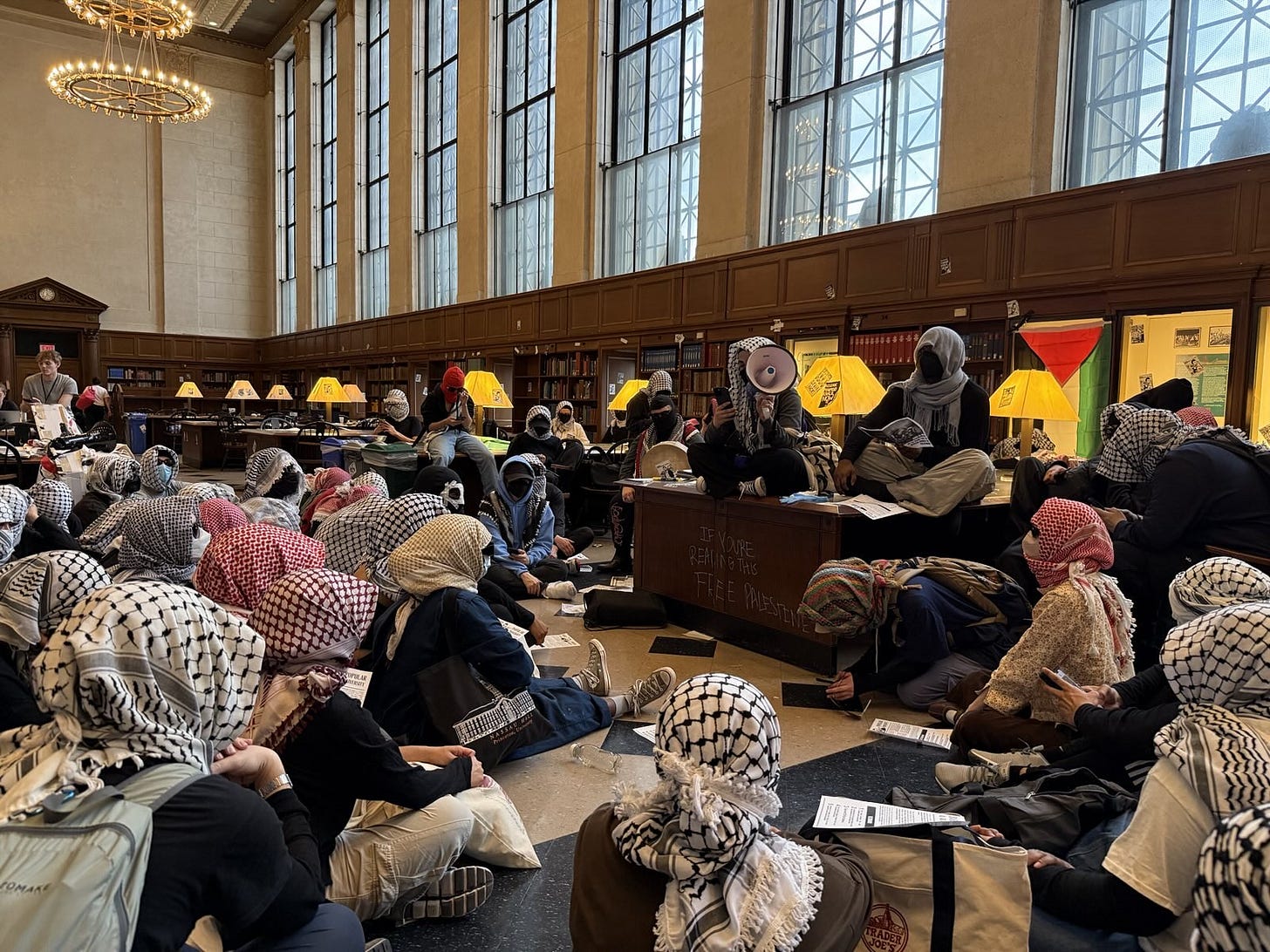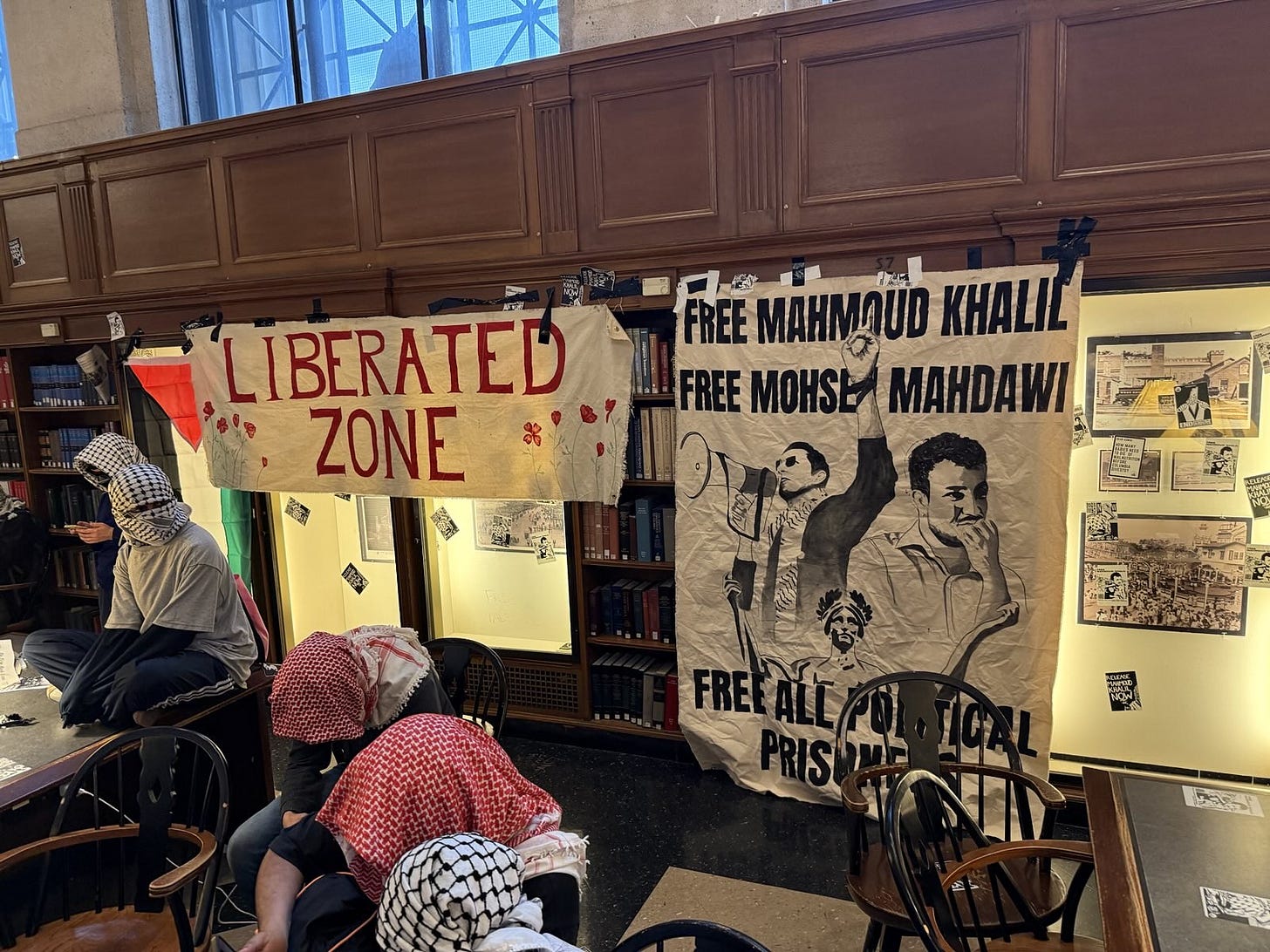PRESS RELEASE: Students Face Expulsion and Extended Suspension for Basel al-Araj Popular University
Columbia admin announces plan to double Palestine-related expulsions in response to Basel al-Araj Popular University
Columbia’s Rules Administrator notified students of plans to pursue harsh sanctions, ranging from one-year suspensions for first time offenders to expulsion, following pro-Palestine protests at Columbia’s largest library last month.
JUNE 12, 2025 — HARLEM, NEW YORK— On the afternoon of June 9, 2025, Columbia University’s Rules Administrator notified students that it plans to pursue exceptionally harsh sanctions for students who allegedly participated in the Basel al-Araj Popular University on May 7, 2025. If the Rules Administrator succeeds, the total expulsions for pro-Palestine protests will more than double from 9 to 24.
In May, protesters flooded Columbia’s flagship library and renamed it to honor Basel al-Araj, symbolically stripping the library of its previous namesake, Nazi sympathizer Nicholas Murray Butler. Basel al-Araj was a Palestinian revolutionary who dedicated himself to studying and teaching the history of Palestinian resistance at the Popular University in the West Bank. Israel murdered al-Araj in 2017 because his revolutionary scholarship encouraged Palestinians to defend themselves by any means against US-funded Zionist colonization and violence.
Students and community members launched the Basel al-Araj Popular University to reclaim the University from billionaire donors while keeping a spotlight on Columbia’s continued funding of Israeli weapons and settlement projects. Amidst a manufactured famine, Israel continues to open fire on aid-seekers, killing at least 249 Palestinians since the US and Israeli-funded distribution centers opened on May 26.
An appeal letter sent to the Rules Administrator on June 4 expands on the rationale behind the Basel al-Araj Popular University, which included a teach-in, but is also an ongoing effort to deepen political education about militant decolonial movements and redistribute walled-off materials from the University to the public:
“Renaming Butler Library to honor Basel al-Araj was a practice of radical pedagogy grounded in liberation, mutual aid, and intellectual resistance. Al-Araj taught that intellectuals must not be spectators but participants in the struggle against oppression. The original Popular University project in the West Bank, of which al-Araj was a member, consisted of teach-ins and reading groups, political discussions over collective meals, and oral history sessions.”
Although the Rules Administrator is charging students with “remain[ing] in a University facility without authorization,” participants repeatedly asked to leave but were impeded by Public Safety officers who kettled them immediately after entry. Officers then strangled and slammed participants to the ground, resulting in at least five concussions and four hospitalizations inside and directly outside the library.
In addition to collaborating with the NYPD to arrest 81 participants, Columbia has proposed substantial sanctions for the Basel al-Araj Popular University that range from one- or two-year suspensions to expulsion and degree revocation, including for students who followed the University’s orders to identify themselves and leave without taking arrest. Disciplinary hearings will be conducted through the University Judicial Board, a disciplinary body inside the University Senate that was gutted of its student panelists after the Trump administration withheld $400 million in grants that have not been restored.
Until this year, Columbia had not expelled any students for political protest since 1968, when hundreds of students participated in an occupation of Hamilton Hall over Columbia’s funding of war research and its plan to steal public land from Harlem residents. In 1968, only two students were expelled despite kidnapping a Dean. In 2016, students demanding Columbia divest from fossil fuels occupied Low Library for eight days; Columbia sanctioned them by insisting they write apology letters. Students surmise that the sharp increase in penalties for relatively minor infractions, including 15 expulsions and year-long suspensions for students with no previous disciplinary records, proves the University singles out pro-Palestine sentiment for exceptionally harsh punishment.
The protestors call on all students, workers, and community members to continue escalating for Palestine. Every direct action protects those being targeted and puts pressure on institutions profiting from genocide. Let the repression breed more resistance.







